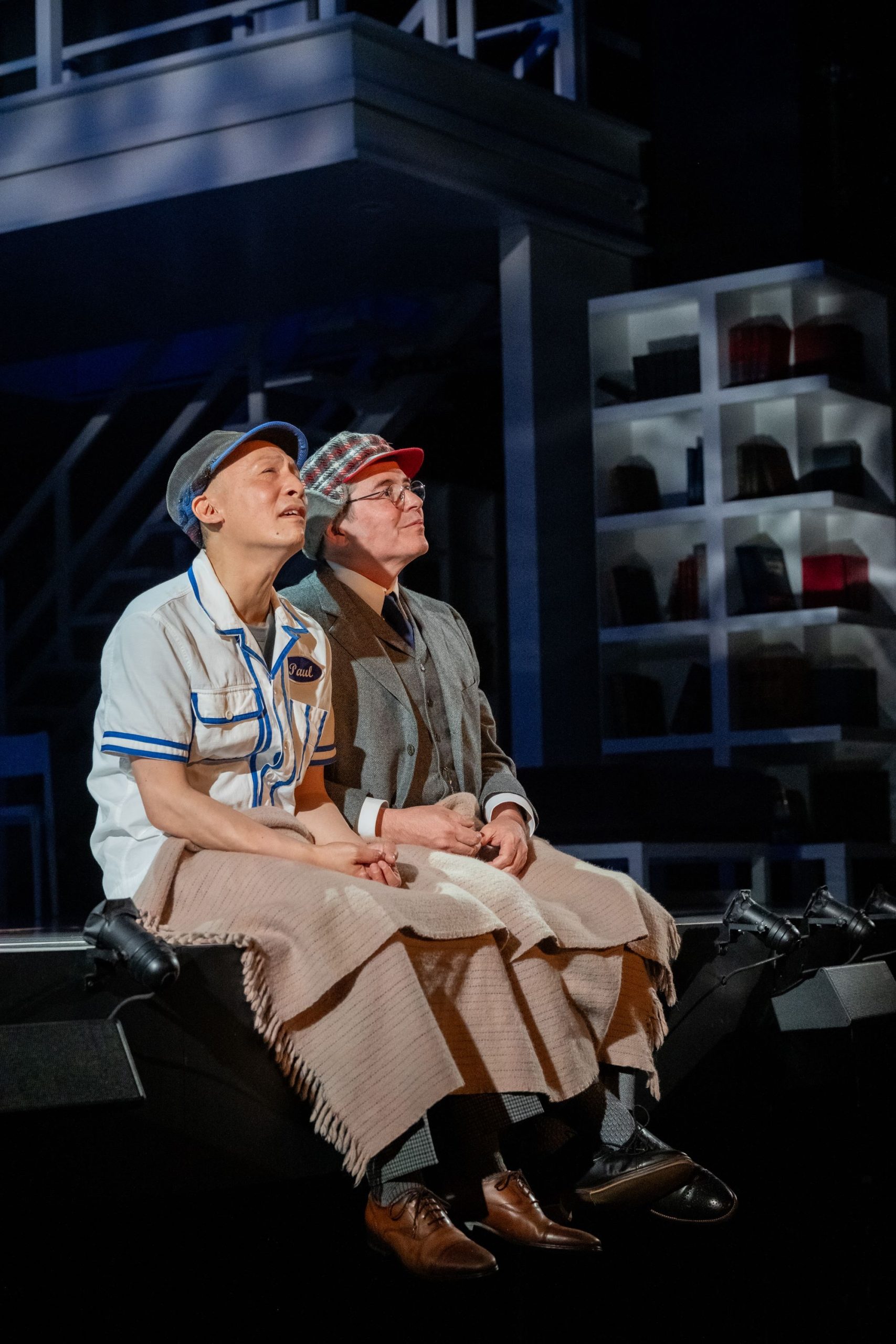Blueberries in the Press

The banality of evil is central to a disturbingly resonant ‘Here There Are Blueberries’
by Charles McNulty
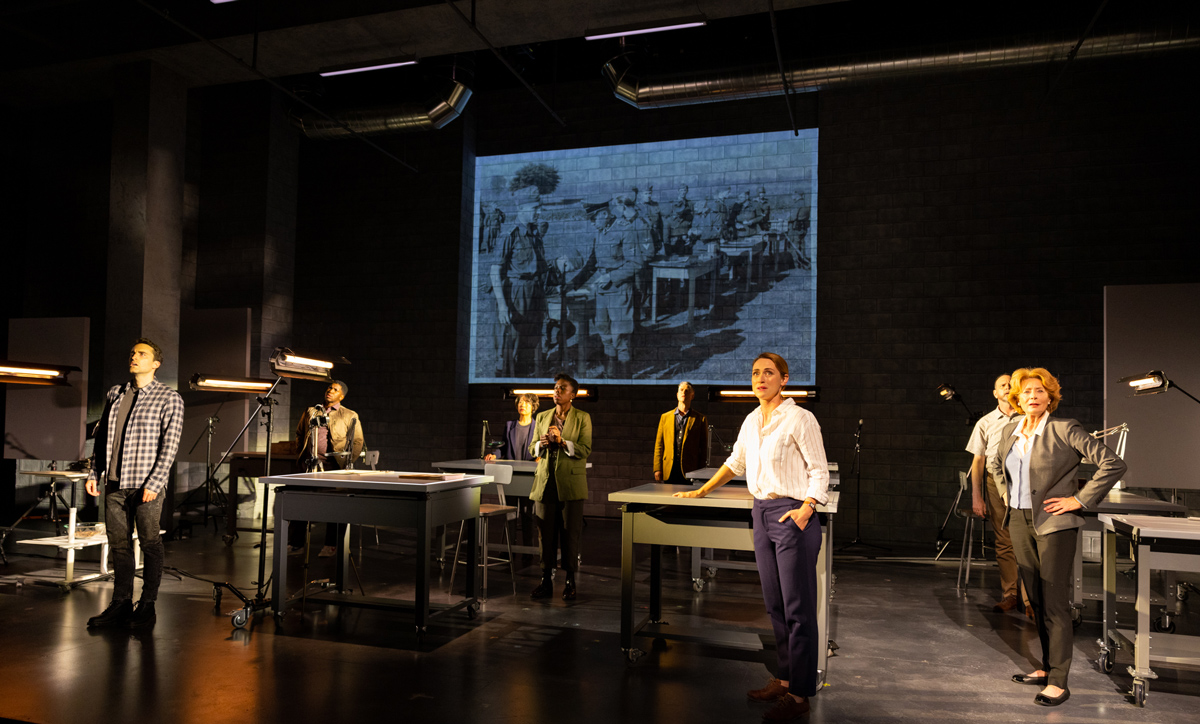
“Here There are Blueberries” is having its world premiere at La Jolla Playhouse. Photo by Rich Soublet II
“Here There Are Blueberries,” a play conceived and directed by Moisés Kaufman, tells the true story of an album of photographs that was sent to the U.S. Holocaust Memorial Museum in 2007.
The sender, a retired United States Army intelligence officer, found the album shortly after the war when he was living in Frankfurt, Germany. Nearing the end of his life, he believed the collection of photos from the Auschwitz concentration camp would be of historical interest. He was right, though it took some impressive detective work to reveal the value of what had been gathering dust in his archives for more than 60 years.
The play, which is having its world premiere at La Jolla Playhouse in a co-production with Tectonic Theatre Project, meditates on the many aspects of this disturbingly resonant story. Kaufman, the artistic director of Tectonic, and Amanda Gronich, a charter member of the company, co-wrote the script, which hews to the factual record while taking artistic liberties for the sake of dramatic clarity, economy and force.

How photos of Nazis partying at Auschwitz gave rise to a new play
‘Here There Are Blueberries,’ at California’s La Jolla Playhouse, is based on photos submitted to an archivist at the U.S. Holocaust Memorial Museum
by Peter Marks
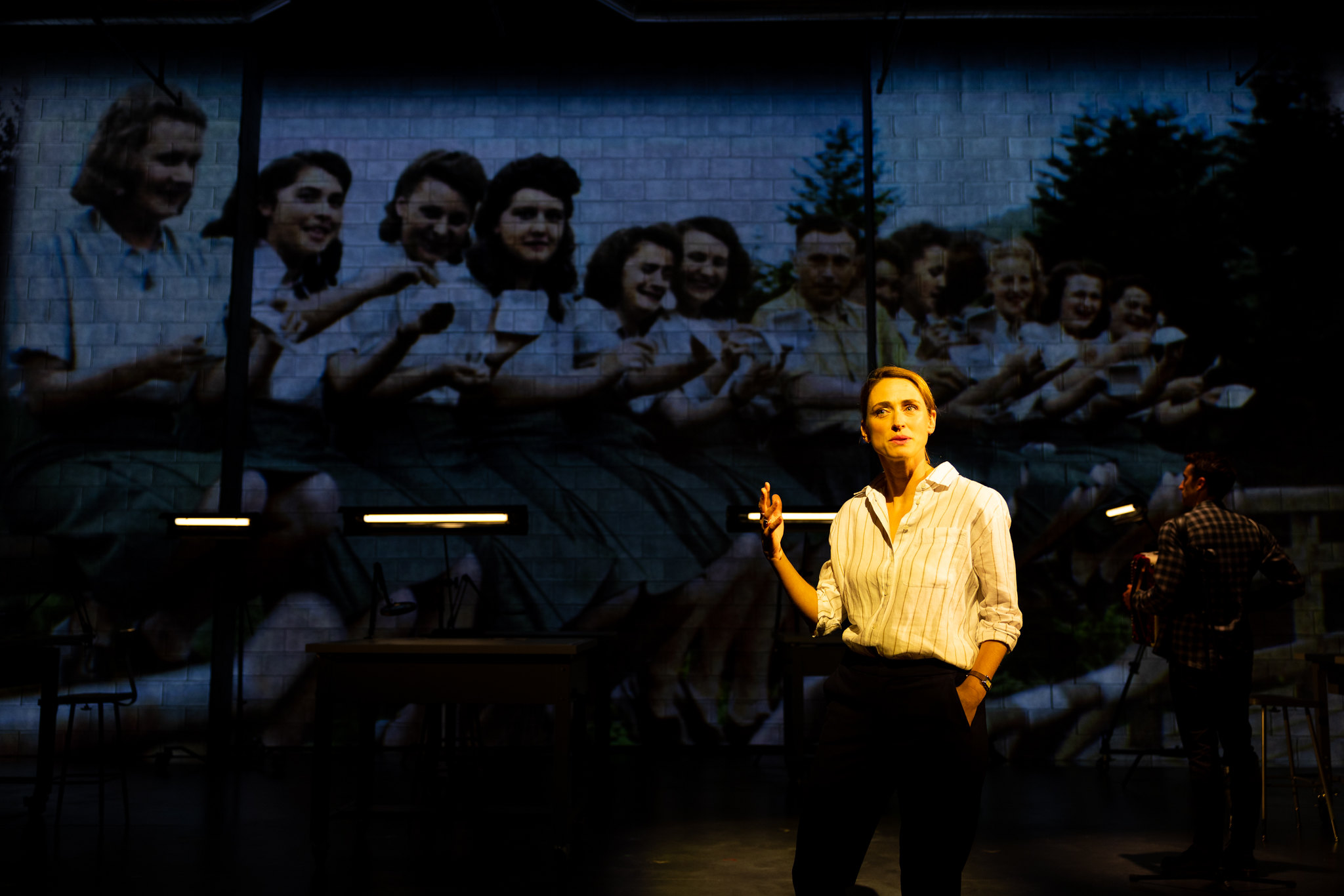
Elizabeth Stahlmann as U.S. Holocaust Memorial Museum archivist Rebecca Erbelding in “Here There Are Blueberries.” In the background is a photograph of young women employed at the Auschwitz concentration camp, relaxing and eating blueberries. (Rich Soublet II)
It started with a photo album, submitted over the transom to the U.S. Holocaust Memorial Museum in Washington, and an archivist who grasped its extraordinary historical value. In the customary story arc of such finds, the photos — of Nazi officers, their families and colleagues wining and dining and relaxing in the sun at the Auschwitz-Birkenau concentration camp and killing center — would have been authenticated and put in the collection, for inspection by scholars and museumgoers.
This astonishing album, however, was also destined for the stage.

La Jolla Playhouse’s ‘Here There Are Blueberries’ a chilling examination of the roots of human cruelty
World premiere play is a coproduction with New York’s Tectonic Theater Project
by Pam Kragen
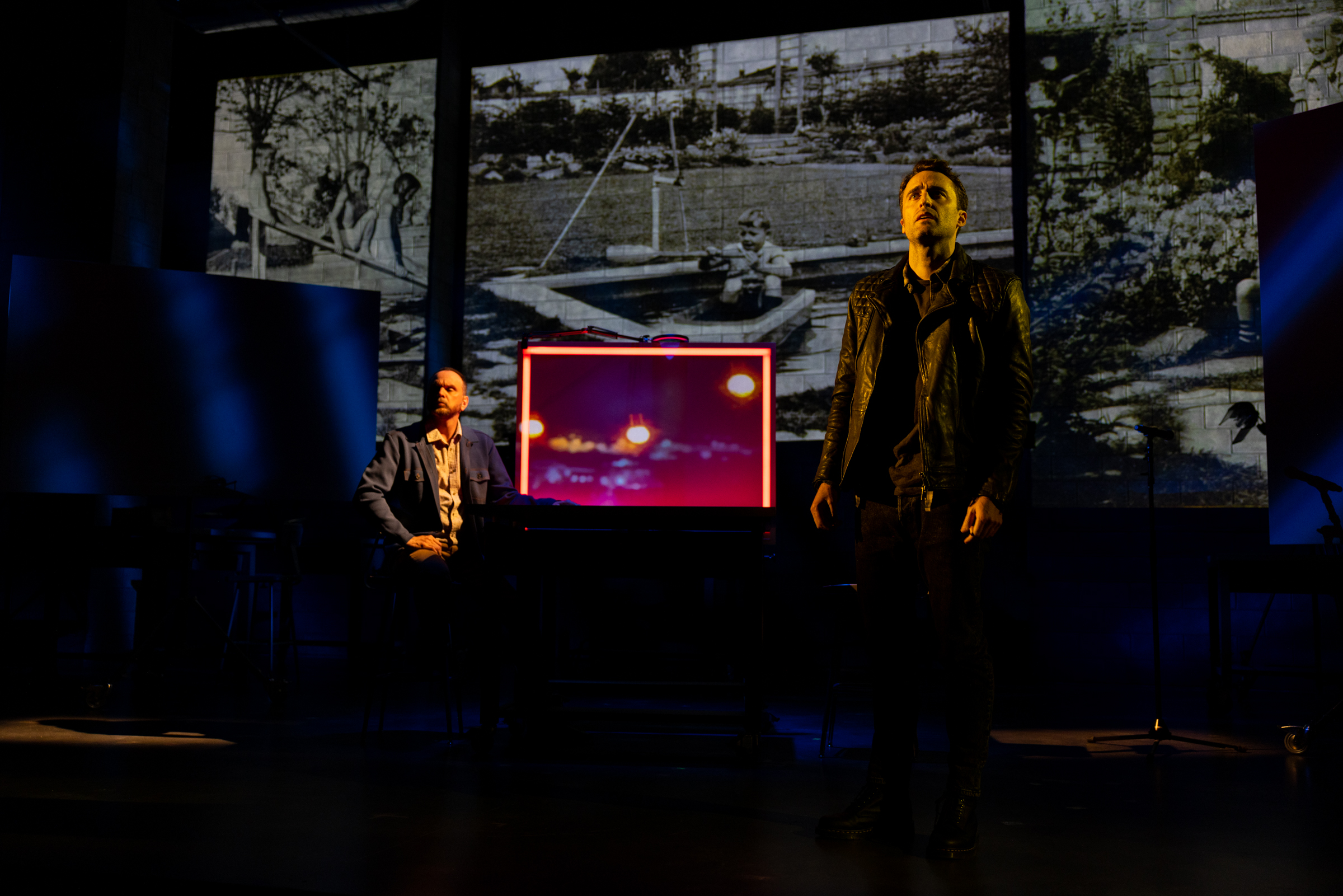
Grant James Varjas, left, and Charlie Thurston as the grandsons of Auschwitz death camp officers in La Jolla Playhouse’s “Here There Are Blueberries.” (Rich Soublet II)
What is the essence of human evil? Surely Adolf Hitler’s “final solution” is on the shortlist.
But what about the German officers, doctors and office workers who ran Hitler’s most efficient death camp, Auschwitz, where more than 1.1 million Jews and others were massacred during World War II? Were they evil, or just regular people swept up in a frenzy of hate and nationalistic propaganda and readily able to emotionally detach themselves from the end results of their work?
Probing the shady areas of human nature is the heart of La Jolla Playhouse’s chilling world-premiere drama “Here There Are Blueberries,” which opened Sunday in a co-production with New York’s Tectonic Theater Project.
The 90-minute play — co-written by Tectonic founder Moisés Kaufman and Amanda Gronich, and directed by Kaufman — dissects in a clean, clinical way the seemingly blissful private lives of the Auschwitz staff in their idle hours.

Review: HERE THERE ARE BLUEBERRIES at La Jolla Playhouse
Quiet and Impactful drama is the latest from Moises Kaufman and the Tectonic Theater Project
by Evan Henerson
Has it really been 22 years, more than two decades, since Moises Kaufman and the Tectonic Theater Project gave us THE LARAMIE PROJECT? Part play, part documentary, LARAMIE examined a significant and horrific event – the murder of Matthew Shepard – and forced us to wrestle down our ways of thinking. Through their play-building process known as Moment Work, Kaufman and the TTP slapped us across the face and changed the game.
Viewers who remember and were affected by THE LARAMIE PROJECT will see parallels in HERE THERE ARE BLUEBERRIES, a beautiful, quieter but no-less-significant new play written by Kaufman and Amanda Gronich, co-produced by the Tectonic Theater Project and directed by Kaufman at the La Jolla Playhouse. Training a sharp lens on the concentration camp at Auschwitz and a historically significant photo album that depicts everyday life not wartime atrocities, the creators of BLUEBERRIES are examining culpability, certainly. But they’re also looking at the complicated and delicate ways that we try to reconcile the past.

New play unravels untold Holocaust history
by Julia Dixon Evans
In 2007, a photo album made its way to the desk of a young archivist at the United States Holocaust Memorial Museum.
That album’s mysterious, surprising contents — and that archivist’s subsequent detective work — are the subject of a new play from New York’s Tectonic Theater Company and La Jolla Playhouse.

La Jolla Playhouse’s ‘Here There Are Blueberries’ to examine the secret lives of Holocaust perpetrators
World premiere play by Moises Kaufman and Amanda Gronich is a co-production with Tectonic Theater Project
by Pam Kragen
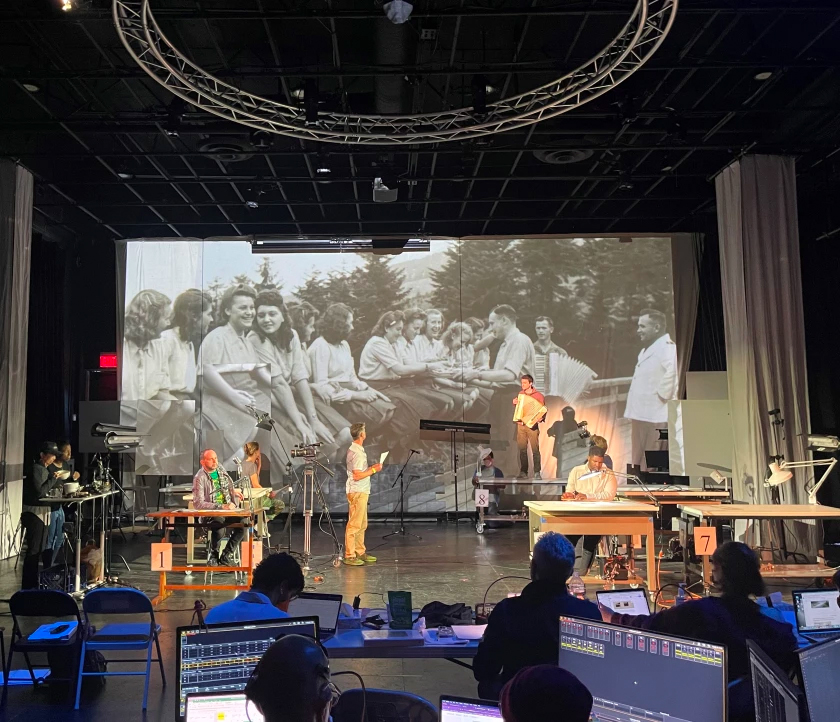
The company of La Jolla Playhouse’s world-premiere production of “Here There Are Blueberries” in rehearsal. (Matt Joslyn)
It’s been 77 years since the first Nazi concentration camps were liberated by Allied troops, exposing to the world the horrors of the Holocaust.
But for all of the camp photos, video footage, mass graves and survivor stories that opened the public’s eyes to the Germans’ systematic extermination of as many as 11 million Jews, Roma, homosexuals and others, one element was always missing from the story: The secret lives of the camps’ administrators, guards and office workers, who fled ahead of the approaching Allied forces and went into hiding.
